Many people ask is God real or not? Does God exist? Is there evidence for God? What are the arguments for God’s existence? Is God alive or dead?
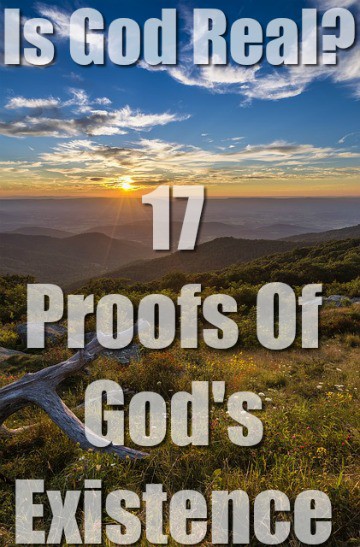
Maybe you’ve struggled with these questions in your mind. This is what this article is all about.
Interestingly, the Bible makes no argument for the existence of God. Instead, the Bible assumes God’s existence from the very first few words, “In the beginning, God…” The biblical writers did not feel a need, apparently, to offer arguments for the existence of God. To deny the existence of God is foolish (Psalm 14:1).
Yet, sadly, many in our day do deny the existence of God. Some deny His existence because they do not want to be accountable to God, and others because they have a difficult time understanding how God can exist and the world be so broken.
Even so, the Psalmist was right, theism is rational, and to deny God is not. In this post we will briefly visit many rational arguments for the existence of God.
When we consider the existence of God, we might wonder if belief in God is rational or some fairy tale to be put aside with the rise of modern science. But modern science raises more questions than it answers. Has the universe always existed? Will it continue to exist forever? Why does our universe and everything in our world follow mathematical laws? Where did these laws come from?
Could everything around us possibly be the result of random chance? Or was a reasoning, rational BEING behind it all?
Einstein once compared our understanding of the laws of the universe with a child wandering into a library with books in foreign languages:
“The child notes a definite plan in the arrangement of the books, a mysterious order, which it does not comprehend, but only dimly suspects. That, it seems to me, is the attitude of the human mind, even the greatest and most cultured, toward God. We see a universe marvelously arranged, obeying certain laws, but we understand the laws only dimly.”
In this article, we will investigate the existence of God. What is the probability of God’s existence? Is believing in God irrational? What evidence do we have for God’s existence? Let’s explore!
Proof
Whenever one mentions the Bible or some other religious text, a challenger objects: “Does God even exist?”. From a child asking the question at bedtime to the atheist debating it in a pub, people have pondered the existence of God throughout the ages. In this article, I will attempt to answer the question “Does God Exist?” from a Christian worldview.
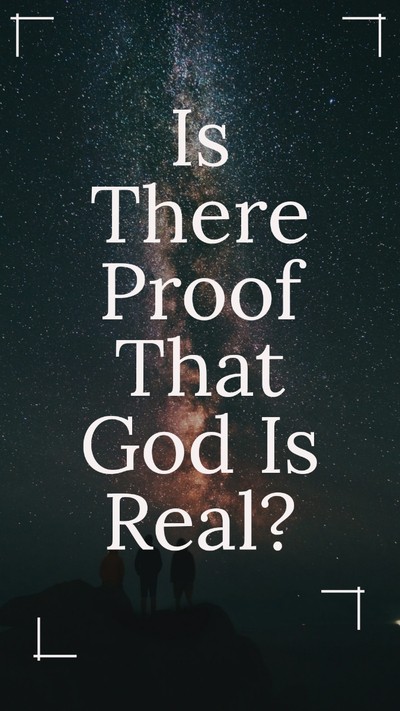
Ultimately, I believe that all men and women know that God is real. However, I believe that some just suppress the truth. I’ve had conversations with people who’ve admitted that they tried to force themselves to believe that God was not real. They fought hard to deny His existence and become an atheist. Ultimately, their attempt to suppress the idea of God failed.
You have to deny everything to claim that God does not exist. Not only do you have to deny everything, but you have to know everything to claim that as well. Here are 17 reasons why God is real.
Imaginary or not?
Is God simply a figment of our imaginations – a way to explain the unexplainable? Some atheists argue that God was created by man, not the opposite. However, such an argument is flawed. If God is imaginary, how does one explain the intricacy of the universe and all the creatures in our world? How does one explain how the universe began?
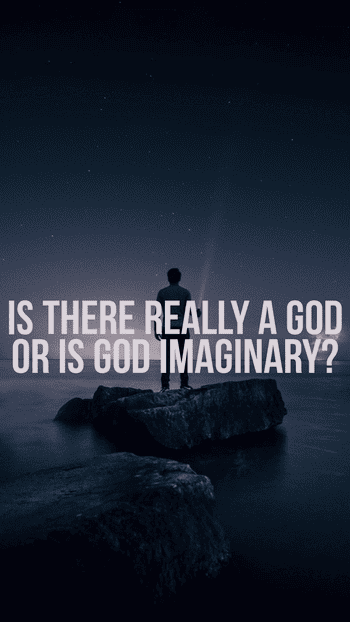
If God is imaginary, how does one explain our universe’s complex design? How does one explain the DNA code in every cell of every living thing? How does one explain the astounding intelligence observed in the design of the simplest cell to our magnificent universe? Where did our universal understanding of morality – our innate sense of right and wrong – come from?
Probability
All living things in our world – even the simplest cells – are incredibly complex. Every part of every cell and most parts of every living plant or animal must be in place for the cell or any other living thing to stay alive. This irreducible complexity points more strongly to the probability that God exists than to a gradual evolutionary path.

A physicist, Dr. Stephen Unwin, used the Bayesian theory of mathematics to calculate the probability of God’s existence, producing a figure of 67% (although he is personally 95% sure of God’s existence). He factored in elements such as universal recognition of goodness and even miracles as proof of God’s existence countered by evil and natural disasters.
First, evil and earthquakes don’t negate the existence of God. God created people with a moral compass but, as Calvin said, man has choice, and his actions stem from his own voluntary choosing. Natural disasters are the results of man’s sin, which brought a curse on humans (death) and on the earth itself. (Genesis 3:14-19)
If Dr. Unwin had not calculated evil against God’s existence, the probabilities would have been much higher. Nevertheless, the point is that even from mathematical calculations attempting to be as objective as possible, the probability of God’s existence is higher than the probability that there is no God.
Christian quotes
“To be an atheist requires an infinitely greater measure of faith than to receive all the great truths which atheism would deny.”
“What can be more foolish than to think that all this rare fabric of heaven and earth could come by chance, when all the skill of art is not able to make an oyster!” Jeremy Taylor
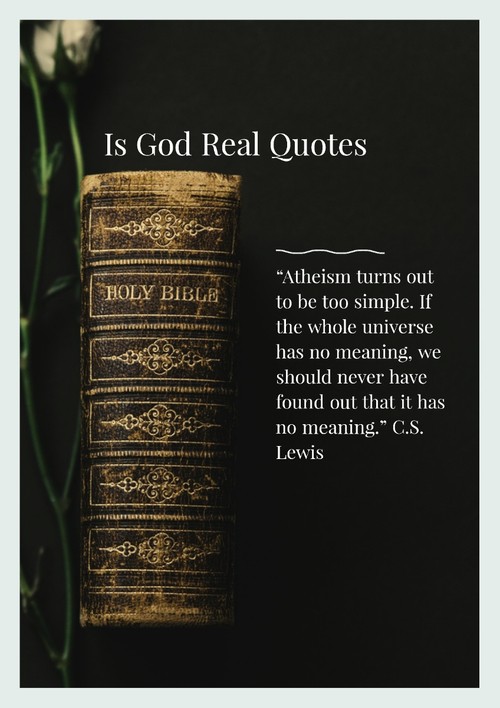
“The atheist can’t find God for the same reason that a thief can’t find a police officer.”
“Atheism turns out to be too simple. If the whole universe has no meaning, we should never have found out that it has no meaning.” – C.S. Lewis

“There is observable order or design in the world that cannot be attributed to the object itself; this observable order argues for an intelligent being who established this order; this being is God (The Teleological Argument, proponents- Aquinas).” H. Wayne House
Atheists who converted to Christianity, Theism, or Deism.

Kirk Cameron – Kirk Cameron likes to call himself “a recovering atheist.” He once believed that he was too smart to believe in fairy tales. One day he was invited to attend church with a family and everything changed. During the sermon he felt guilty over sin and he was amazed by the awesome love and compassion of God found in Jesus Christ. After the service, he was bombarded by many questions in his mind such as, where did we come from? Is there really a God in heaven?
After weeks of struggling with questions, Kirk Cameron bowed his head and asked for forgiveness for his pride. He opened his eyes and he felt an overwhelming sense of peace unlike anything he has ever experienced. He knew from that moment on that God was real and Jesus Christ died for his sins.
Antony Flew – At one point in time, Andrew Flew was the world’s most famous atheist. Anthony Flew changed his mind about God because of recent discoveries in biology and the integrated complexity argument.
Does a God exist?
When someone asks this question, it is usually because the person has been pondering the world, nature and the universe and has wondered – How did all this get here? Or some kind of suffering has occurred in their life and they are wondering if anyone cares, especially a higher power. And if there is a higher power, why didn’t that higher power prevent the suffering from happening.
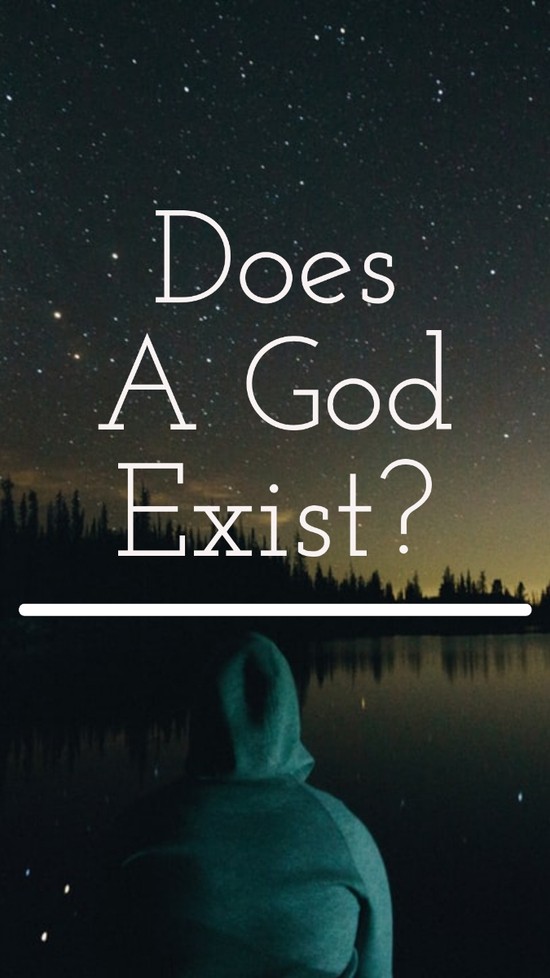
In the 21st century, the philosophy of the day is scientism, which is the belief or thinking that science alone can yield knowledge. Yet the COVID pandemic has broken that belief system by pointing to the fact that science is not the source of knowledge, but simply the observation of nature and thus, based on observation of changing data, knowledge gained from science is not static but mutable. Hence the changing laws and evolving restrictions based on new observations of data. Scientism is not the way to God.
Yet still, people want scientific evidence of the existence of God, a scientific or observable, proof. Here are four evidences for the existence of God:
- Creation
One only has to look inside and outside of themselves, at the complexities of the human body to the vastness of the universe, of things known and unknown, to ponder and wonder: “Could all of THIS be random? Is there not intelligence behind it?” Just as the computer I am typing on did not just come to be through happenstance but took many many minds, engineering and creativeness, and years of technological advances by the creativity of humans, to be the computer that I have today, so there is evidence of the existence of God by looking at the intelligent design of creation. From the beauty of its landscape to the intricacies of the human eye.
The Bible points to the fact that creation is evidence that there is a God:
The heavens declare the glory of God, and the sky above proclaims his handiwork. Psalm 19:1 ESV
For what can be known about God is plain to them, because God has shown it to them. For since the creation of the world His invisible attributes, His eternal power and divine nature, have been clearly seen, being understood through what has been made, so that they are without excuse. Romans 1:19-20 ESV
- Conscience
The conscience of a person is evidence that there is a God of higher justice that exists. In Romans 2, Paul writes about how the Jews were given God’s Word and Law to teach them the difference between right and wrong and to be judged accordingly. However, tThe Gentiles did not have that law. But they did have a conscience, an unwritten law, for which also taught them the difference between right and wrong. It is a moral compass that everyone is born with. A pursuit of and for justice and when one goes against that conscience, they stand guilty and in shame for breaking that law.
Where did this conscience come from? What or who writes this moral code on our hearts to be able to discern from right and wrong? This is an evidence that points to the existence of Being that is above the human plane of existence – a Creator.
- Rationality
A rational person, employing their analytic mind, must grapple with the uniqueness of the Bible. No other religious text is like it. It claims to be the very Word of God, breathed out, or inspiring, over 40 different authors over a time period of 1500 years, and yet cohesive, unified and in agreement.
There is nothing else like it. Prophecy written 100s to 1000s of years before has come true.
The archeological evidence that keeps being discovered continues to confirm the authenticity of the Scriptures. There is very, very little copy error when ancient copies are compared against one another with more modern copies (less than .5% errors which does not impact meaning). THis is after comparing over 25,000 known copies. If you look at other ancient texts, such as Homer’s Iliad, you will see quite a bit of differentiation caused by copy errors when comparing the 1700 copies that are available. The oldest copy of Homer’s Illiad that has been found is 400 years after he wrote it. The earliest Gospel of John that has been discovered is less than 50 years after the original.
Applying rational thinking, one must consider this, and much more, of the overwhelming evidence of the historicity of the Bible, of what the Bible contains and talks about, and of the historicity of Jesus and His claims. You cannot ignore the facts. And if the Bible is historically accurate as leading experts agree that it is, then it must be taken seriously as evidence for God.
- Human experience
It would be one thing if one person, or even a few persons, claim that a God exists and is active in world affairs. But most statisticians estimate that over 2.3 billion people worldwide subscribe to the Judeo-Christian belief that a God does exist and is involved in a personal way in people’s lives. The human experience of people’s testimonies of this God, of their willingness to change their lives because of this God, of their willingness to lay down their lives in martyrdom for this God, is overwhelming. Ultimately, human experience could be one of the strongest evidences of the existence of God. As the lead singer of U2, Bono, once said, “The idea that the entire course of civilization for over half of the globe could have its fate changed and turned upside-down by a nutcase [referring to the title some have given Jesus who claimed to be the Son of God], for me, that’s farfetched.” In other words, it is one thing to say that 100, or even a 1000 people, are delusional about the existence of God, but when you think about over 2.3 billion people claiming this belief, and billions more of other faiths and religions subscribing to a monotheistic God, that is something else entirely different.
Rational or irrational?
Logic determines whether something is rational or irrational. Rational thought considers the universal laws of logic like cause and effect (this happened because of that) or non-contradiction (a spider can’t be alive and dead at the same time).
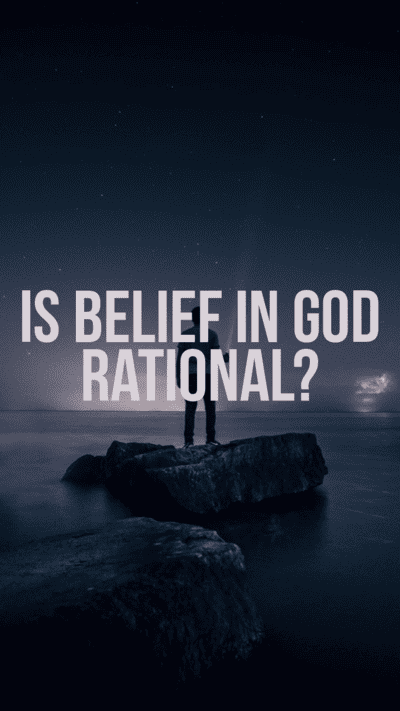
Yes! Belief in God is rational, and atheists know this deep down, but they have suppressed this understanding (Romans 1:19-20). If they agree that God exists, then they know they are responsible for their sin, and that is terrifying. “They suppress the truth in unrighteousness.”
Atheists irrationally convince themselves God doesn’t exist, so they don’t have to accept that human life is valuable, that they are responsible for their actions, and that they must follow a universal moral code. The funny thing is that most atheists do believe all three of these things, but without any rational logic to back them up.
An atheist struggles with laws of logic: how could these universal, unchanging laws exist in a world formed by chance? How can the concept of rationality even exist – how can we reason rationally – without being created that way by a rational God?
If He doesn’t exist

Let’s suppose for a moment that God did not exist. What would that mean to the human experience? The answers to the deepest longing of our hearts would go unanswered: Purpose – Why am I here? Meaning – Why is there suffering or why am I suffering? Origin – How did all this get here? Accountability – Who am I accountable to? Morality – What is right or wrong and who determines it? Time – Was there a beginning? Is there an end? And what happens after I die?
As the writer of Ecclesiastes pointed out, life under the sun and apart from God is in vain – it is meaningless.
How many gods are there?
Someone may ask if there is a God, is there more than one?
Hindus believe that there are millions of gods. This would be an example of a polytheistic religion. Many of the ancient civilizations also ascribed to polytheistic beliefs, such as the Egyptians, Greeks and Romans. These gods all represented certain aspects of the human experience or objects in nature, such as fertility, death and the sun.
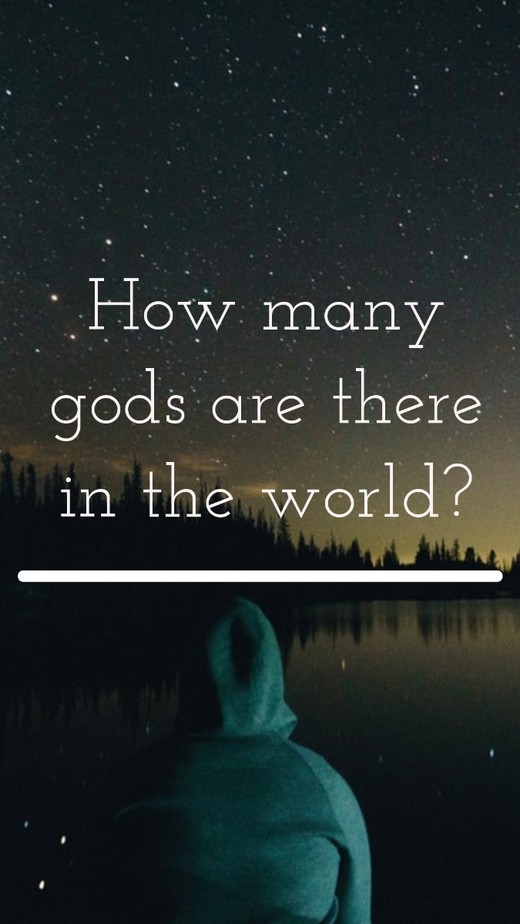
For much of world history, the Jews stood alone in their claim of monotheism, or the belief of One God. The Jewish Shema, found in Deuteronomy, is their creed that expresses this: “Hear, O Israel: The Lord our God, the Lord is one.” Deut 6:4 ESV
Though many may ascribe created things or people as being gods, the Bible clearly condemns such thinking. God spoke through Moses in the ten commandments, where He said:
“I am the Lord your God, who brought you out of the land of Egypt, out of the house of slavery. 3 You shall have no other gods before me. 4 You shall not make for yourself a carved image, or any likeness of anything that is in heaven above, or that is in the earth beneath, or that is in the water under the earth. 5 You shall not bow down to them or serve them, for I the Lord your God am a jealous God, visiting the iniquity of the fathers on the children to the third and the fourth generation of those who hate me, 6 but showing steadfast love to thousands of those who love me and keep my commandments.” Exodus 20:2-6 ESV
Explaining God
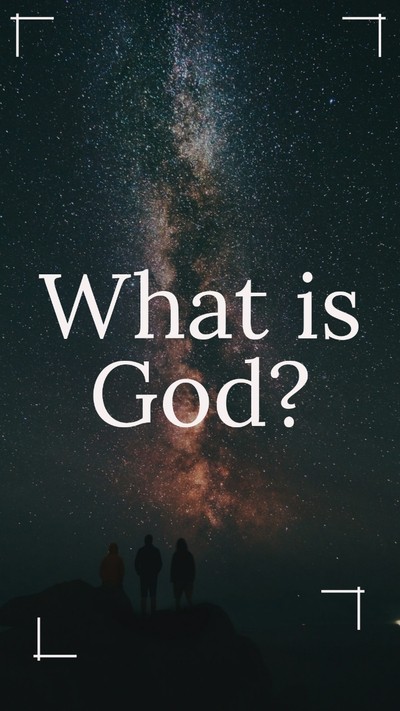
Have you ever asked yourself who is God or what is God? God is supreme above all things. He is the Creator and Ruler of the universe. We will never be able to comprehend the great depths of who God is. From the Bible we know that God is necessary for the creation of all things. God is a purposeful, personal, omnipotent, omnipresent, and an omniscient Being. God is one Being in three divine Persons. The Father, Son, and the Holy Sprit. God has revealed Himself in science and also in history.
But, who created Him?

God is the only self-existent being. No one created God. God exists outside of time, space, and matter. He is the only eternal being. He is the uncaused cause of the universe.
His power
If there is an all-powerful God, where and how did He get that power?
This question is similar to where did God come from? Or how did God come to be?

If all things need a cause, then something caused God to be or to become all powerful, or so the argument goes. Nothing comes from nothing, so how did something come from nothing if there was nothing and then there was an all powerful God?
This line of reasoning assumes that God came from something and that something made Him powerful. But God was not created. He simply was and has always been. He has always existed. How do we know? Because something exists. Creation. And since nothing can exist without something causing it to exist, there had to be something in existence always. That something is the eternal, everlasting, and all powerful God, uncreated and unchanging. He has always been powerful because He has not changed.
Before the mountains were brought forth, or ever you had formed the earth and the world, from everlasting to everlasting you are God. Psalm 90:2 ESV
By faith we understand that the universe was created by the word of God, so that what is seen was not made out of things that are visible. Hebrews 11:13 ESV
Is there a God gene?
The late 20th and early 21st centuries brought about scientific advances in the field of genetics research as scientists discovered more and more understanding about what makes us humans and how we are related to one another through a genetic code. Much research has been focused on the social aspect of human behavior, seeking understanding through genetics.
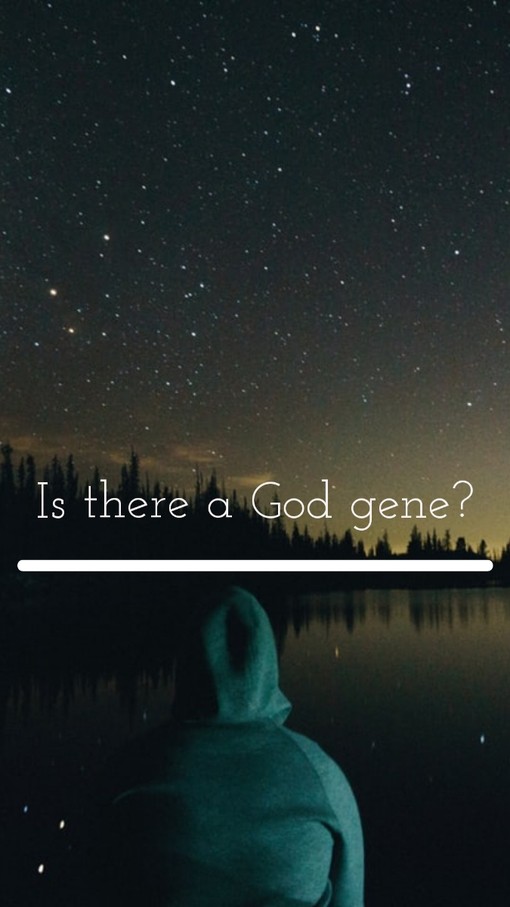
One scientist by the name of Dean Hamer proposed a hypothesis, popularized in his book “The God Gene: How Faith is Hardwired into our Genes” that humans who contain a strong presence of certain genetic material are pre-dispositioned to believe in spiritual things. Therefore, we can determine that certain people will believe in God more than others based upon their genetic makeup.
Hamer’s motivation is self-disclosed within the book itself, as he proclaims himself to be a materialist scientist. A materialist assumes there is no God and that all things must have material answers or reasons for why they occur. Therefore, according to this viewpoint, all emotions and human behavior are the result of chemicals in the body, genetic predispositions and other biological or environmental conditions.
This viewpoint naturally flows out of an evolutionary worldview that the world and human beings are here by chance based upon chemicals and conditions lining up to allow biological life to exist. And yet, the God Gene hypothesis does not answer the arguments for the existence of God already stated in this article, and therefore falls short of any explanation to disprove the existence of God as a mere chemical or genetic disposition in humans.
Location

If there is a God, where does He live? Where is He? Can we see Him?
In terms of His reigning presence as Majesty and Lord over all, God is in heaven sitting in His holy throne. (Ps 33, 13-14, 47:8)
But the Bible teaches that God is everywhere present, or Omnipresent (2 Chronicles 2:6). This means that He is as much in heaven as He is in your bedroom, out in the woods, in the city and even in Hell (though it should be noted that though God is present in Hell, it is only His wrathful presence, compared to His gracious presence with His church).
Additionally, since the New Covenant through Christ, God also lives in His children. As the Apostle Paul writes:
“Do you not know that you are God’s temple and that God’s Spirit dwells in you?” 1 Corinthians 3:16 ESV
Books
How To Know God Exists: Scientific Proof Of God – Ray Comfort

Moral Argument for the Existence of God – C. S. Lewis
Can Science Explain Everything? (Questioning Faith) – John C. Lennox
The Existence and Attributes of God: Volumes 1 & 2 – Stephen Charnock
The Comprehensive Guide to Science and Faith: Exploring the Ultimate Questions About Life and the Cosmos – William A. Dembski
I Don’t Have Enough Faith to Be an Atheist – Frank Turek
Does God Exist? – R.C. Sproul
Famous Atheists: Their Senseless Arguments and How to Answer Them – Ray Comfort
Making Sense of Who God Is – Wayne Grudem
Math and God
In the 11th century, Saint Anselm of Canterbury, a Christian philosopher and theologian, developed what has been called the ontological argument for proving the existence of God. In sum, one can prove the existence of God purely through logic and reasoning by appealing to absolutes.
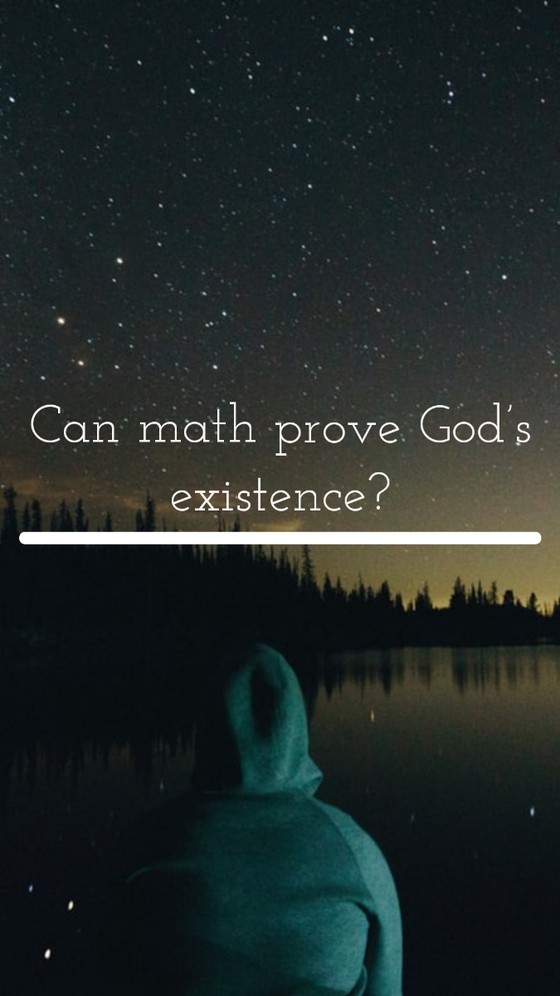
One form of an ontological argument is using math, which became popular in the 20th century through Kurt Gödel. Gödel created a mathematical formula he proclaimed proved the existence of God. Math deals in absolutes, just as Anselm believed that there are other absolutes for measures of goodness, knowledge and power. Just like Anselm, Gödel uses the idea of the existence of good to equate the existence of God. If there is an absolute measure of goodness, then the “most good” thing must exist – and that “most good” thing must be God. Gödel devised a mathematical formula based on the ontological argument which he believed proved the existence of God.
One form of an ontological argument is using math, which became popular in the 20th century through Kurt Gödel. Gödel created a mathematical formula he proclaimed proved the existence of God. Math deals in absolutes, just as Anselm believed that there are other absolutes for measures of goodness, knowledge and power. Just like Anselm, Gödel uses the idea of the existence of good to equate the existence of God. If there is an absolute measure of goodness, then the “most good” thing must exist – and that “most good” thing must be God. Gödel devised a mathematical formula based on the ontological argument which he believed proved the existence of God.
It is an interesting argument, and certainly worth dwelling on and considering. But for most atheists and non-believers, it is not the strongest proof of the existence of God.
Morality argument
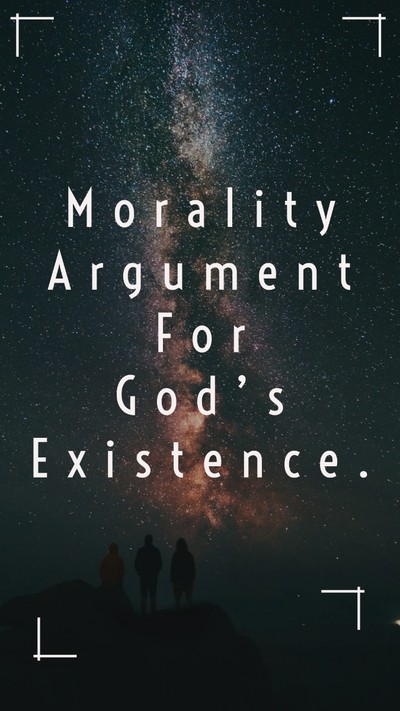
We know that God is real because there is a moral standard and if there is a moral standard, then there is a transcendent moral Truth Giver. The moral argument has a few variations in the way it is articulated. The kernel of the argument dates back only to Immanuel Kant (1724-1804), so it is one of the “newer” arguments in this post.
The simplest form of the argument is that since it is obvious that there is a “perfect moral ideal” then we should assume that that ideal had an origin, and the only rational origin for such an idea is God. Putting it into even more basic terms; since there is a such thing as objective morality (murder, for example, is never a virtue in any society or culture), then that objective moral standard (and our sense of duty to it) must come from outside of our experience, from God.
People challenge this argument by challenging the presupposition that there is an objective moral standard, or to argue that God is not necessary; that finite minds and the societies they make up are able to contemplate moral standards for the common good. Of course, this is undermined even by the word good. Where did the concept of good come from and how do we distinguish good from evil.
This is a particularly compelling argument, especially when we are confronted with unquestioned evil. Many, even among those who argue against the existence of God, would argue that Hitler was objectively evil. This admission of objective morality points to the God, the one who established those moral categories in our hearts.
Many atheists and agnostics make the mistake of thinking that Christians are saying that they have no morals, which is not true. The argument is where do morals come from? Without God everything is just someone’s subjective opinion. If someone says that something is wrong because they don’t like it, then why is that the standard? For example, if someones says that rape is wrong because the victim doesn’t like it, why is that the standard? Why is something right and why is something wrong?
The standard can’t come from something that changes so it can’t come from the law. It has to come from something that remains constant. There has to be a universal truth. As a Christian/theist I can say that lying is wrong because God is not a liar. An atheist can’t say that lying is wrong without jumping into my theistic worldview. Our conscience tells us when we do something wrong and the reason for that is, God is real and He has implemented His law in our hearts.
Romans 2:14-15 “Even Gentiles, who do not have God’s written law, show that they know his law when they instinctively obey it, even without having heard it. They demonstrate that God’s law is written in their hearts, for their own conscience and thoughts either accuse them or tell them they are doing right.”
Teleological argument
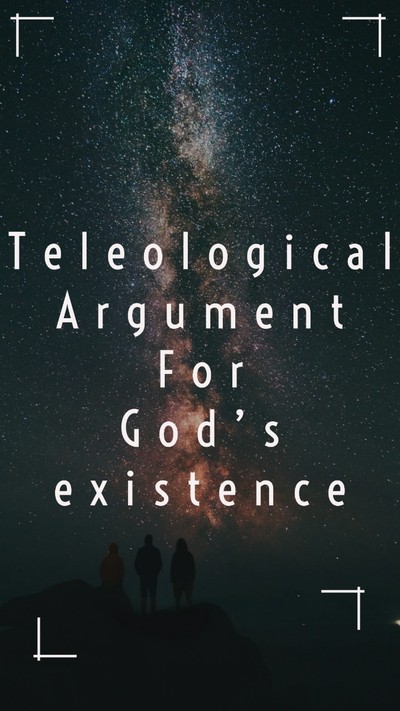
This argument can be illustrated in the story of where my automatic watch came from. As you may know, an automatic (self-winding) watch is a mechanical wonder, full of gears and weights and jewels. It is precise and needs no battery – the movement of one’s wrist keeps it wound.
One day, as I was walking on the beach, the sand began to swirl in the wind. The earth around my feet was also moving, probably due to geologic forces. The elements and materials (metals from rocks, glass from sand, etc.) began to come together. After a good while of random swirling the watch began to take shape, and when the process was complete, my finished watch was ready to wear, set to the right time and all.
Of course, such a story is nonsense, and any rational reader would see it as fanciful story- telling. And the reason that it is such obvious nonsense is because everything about a watch points to a designer. Someone collected the materials, formed and shaped and manufactured the parts, and assembled it according to a design.
The teleological argument, put most simply, is that design demands a designer. When we observe nature, which is billions of times more complex than the most advanced wrist watch, we can see that things have design, which is evidence of a designer.
Detractors of this argue that given enough time, order can develop out of disorder; thus, giving the appearance of design. This falls flat though, as the illustration above would demonstrate. Would billions of years be enough time for a watch to form, come together and display the correct time?
Creation screams that there is a creator. If you find a cell phone on the ground, I guarantee that your first thought is not going to be wow it magically appeared there. Your first thought is going to be that someone dropped their phone. It didn’t just get there on its own. The universe reveals that there is a God. This leads me to my next point, but before I start, I know that some people are going to say, “well how about the Big Bang theory?”
My response is that, science and everything in life teaches us that something can never come from nothing. There has to be a catalyst. It is intellectual suicide to believe it can. How did your house get there? Someone built it. Look all around you right now. Everything that you are looking at, was made by someone. The universe did not get here on its own. Stretch your arms out in front of you. Without moving them and without anyone moving your arms, will they move from that position? The answer to this question, is no!
You can look at your TV or phone and instantly know that it was made by an intelligence. Look at the complexity of the universe and look at any human and you know they were made by an intelligence. If a phone was intelligently made that means the creator of the phone was intelligently made. The creator of the phone has to have an intelligent being to create him. Where does intelligence come from? Without an all-knowing God you can’t account for anything. God is the Intelligent Designer.
Romans 1:20 “For since the creation of the world His invisible attributes, His eternal power and divine nature, have been clearly seen, being understood through what has been made, so that they are without excuse.”
Psalm 19:1 “For the choir director. A Davidic psalm. The heavens declare the glory of God, and the sky proclaims the work of His hands.”
Jeremiah 51:15 “It is he who made the earth by his power, who established the world by his wisdom, and by his understanding stretched out the heavens.”
Psalm 104:24 “How many are your works, LORD! In wisdom you made them all; the earth is full of your creatures.”
The Cosmological argument
This argument has two parts to it, and they are often described as the vertical cosmological argument and the horizontal cosmological argument.
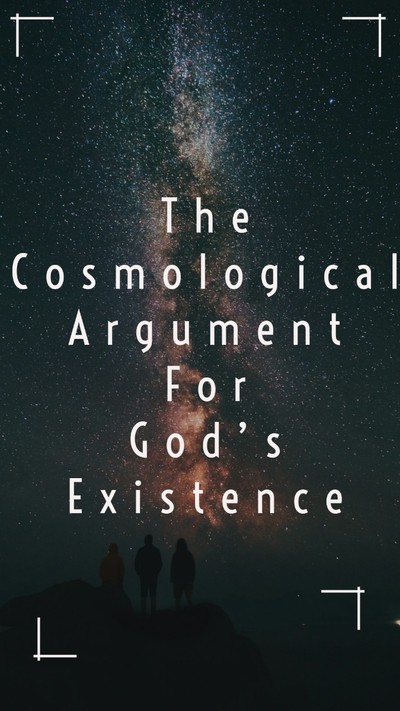
The horizontal cosmological argument for the existence of God looks back to Creation and the original cause of all things. We can observe causes for everything in nature (or assume causes in the cases in which we cannot observe the actual cause firsthand. Thus, tracing these causes back we can deduce that there must be original cause. The original cause behind all of creation, the argument asserts, must be God.
The vertical cosmological argument for the existence of God reasons that behind the being of the universe that now exists, there must be a cause. Something, or someone must be sustaining the universe. The cosmological argument asserts that the only rational conclusion is that a supreme being, independent of the universe and its laws, must be the sustaining force behind the being of the universe. As the Apostle Paul said, He is before all things, and in him all things hold together.
Ontological argument
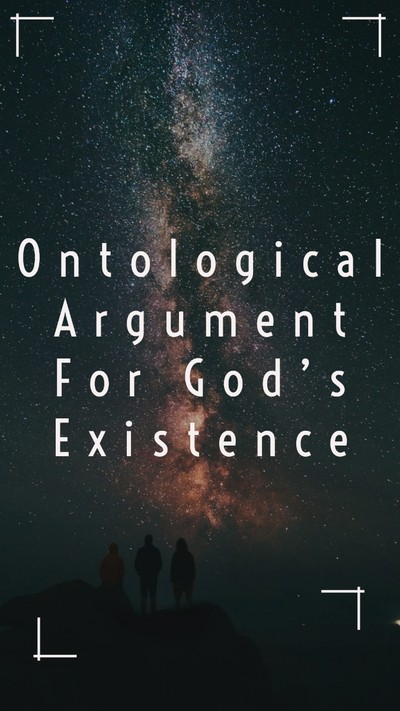
There are many forms of the Ontological Argument, all of which are very complex and many have been abandoned by modern theist apologists. In its simplest form the argument works from the idea of God to the reality of God.
Since man believes that God exists, God must exist. Man could not have an idea of God in the mind (lesser) if the reality of God (greater) did exist. Since this argument is so complex, and since most find it unpersuasive, this briefest of summaries is probably sufficient.
The transcendental argument
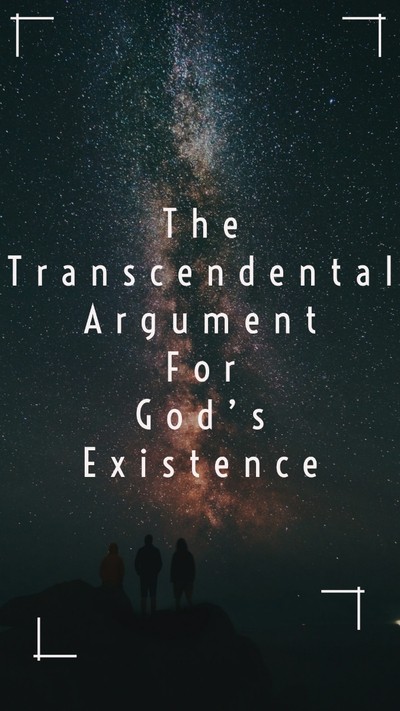
Another argument with roots in the thought of Immanuel Kant is the Transcendental Argument. The argument states that in order to make sense of the universe, it is necessary to affirm the existence of God.
Or, put the other way, to deny the existence of God is to deny the meaning of the universe. Since the universe has meaning, God must exist. The existence of God is a necessary precondition of the existence of the universe.
Science
Let’s talk about the Science Vs God debate. Science, by definition, cannot prove the existence of anything. One scientist famously declared that science cannot prove the existence of science. Science is a method of observation. The “scientific method” is a way to observe things by making hypotheses and then testing the validity of the hypothesis. The scientific method, when followed, results in a theory.
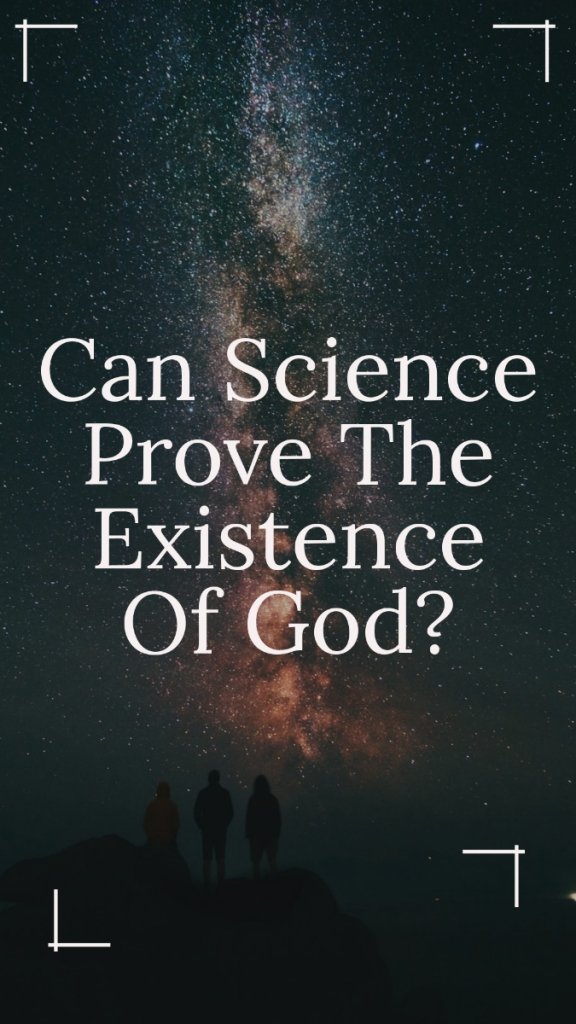
Therefore science is of very limited use within theistic apologetics (arguments for the existence of God). Further, God is not testable in the sense that the physical world is testable. The Bible teaches that God is spirit. It should also be noted, however, that science is equally unable to prove that God does not exists, even though many in our present day argue to the contrary.
Further, science is very concerned with cause and effect. Every effect must have a cause. We can trace many effects to their causes, and much of science is occupied in this pursuit. But man, through scientific observation, has yet to discern an original cause or a first cause. Christians, of course, know that the original cause is God.
DNA
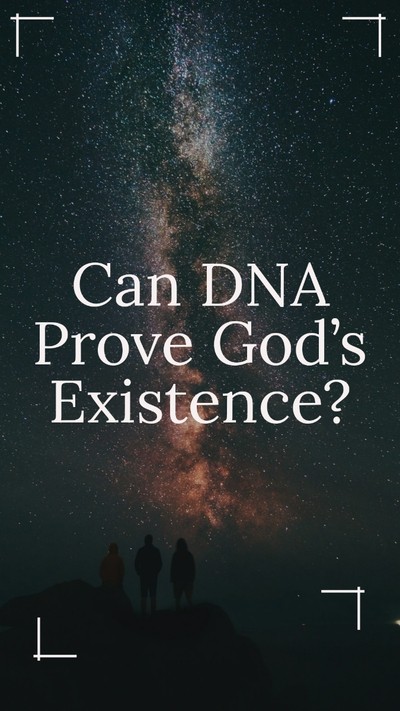
We all will agree that DNA is complex. In this area, Evolution fails to provide answers. DNA was clearly created by an intelligent source, an intelligent writer of the code.
DNA does not, by itself, prove God’s existence. Yet, DNA clearly shows that life has design, and using one of the most persuasive arguments in this post – teleological argument – we can argue that the evidence of design in DNA. Since DNA shows design, there must be a designer. And that designer is God.
The complexity of DNA, the building blocks of all life, shatters belief in random mutation. Ever since the human genome was decoded two decades ago, most microbiology researchers now understand that the most basic cell is infinitely more complex than previously thought.
Each chromosome contains tens of thousands of genes, and researchers have discovered a sophisticated “software:” a code that directs DNA’s functions. This higher control system is responsible for the development of a single fertilized egg cell into more than 200 cell types that form the human body. These control tags, known as the epigenome, tell our genes when, where, and how they are to be expressed in each of our sixty trillion cells.
In 2007, the ENCODE study revealed novel information about “junk DNA” – 90% of more of our genetic sequences that seemed useless gibberish – what scientists previously thought were the leftovers from millions of years of evolution. Nothing could be further from the truth! The so-called “junk DNA” is actually quite functional in a wide variety of cell activities.
The breathtakingly-complex genome/epigenome system points to life designed by a brilliant Creator. It underscores the empirical problems with Darwinian theory with its mindless, undirected processes.
Different races prove God
The fact that there are different races shows that God is real. The fact that there are African-American people, Spanish people, Caucasian people, Chinese people, and more, has a unique Creator written all over it.
All humans from every nation and “race” are descendants of one man (Adam) who was created in the image of God (Genesis 1:26-27). Adam and Eve were generic in race – they weren’t Asian, Black, or White. They carried the genetic potential for the characteristics (skin, hair, and eye color, etc.) that we associate with certain races. All human beings carry the image of God in their genetic code.
“Both the dignity and the equality of human beings are traced in Scripture to our creation.” ~ John Stott
All humans – from all races and from the moment of conception – carry their Creator’s imprint, and thus all human life is sacred.
“He made from one man every nation of mankind to live on all the face of the earth, having determined their appointed times and the boundaries of their habitation, that they would seek God, if perhaps they might feel around for Him and find Him, though He is not far from each one of us; for in Him we live and move and exist . . . ‘For we also are His descendants.’” (Acts 17:26-28)
New genetic findings demolish our old ideas about race. We didn’t all evolve from three (or five or seven) ape-like progenitors in distinct parts of the world. The genetic makeup of all people on earth is astoundingly similar. A landmark 2002 study by Stanford University scientists looked at 4000 alleles from various people groups around the world. (Alleles are the part of a gene that determines things like hair texture, facial features, height, and hair, eye, and skin color).
The study showed that individual “races” don’t have a uniform genetic identity. In fact, the DNA of a “white” man from Germany can be more similar to someone in Asia than to his “white” neighbor across the street. “In the biological and social sciences, the consensus is clear: race is a social construct, not a biological attribute.”
OK, so why do people from various parts of the world look different? God created us with an incredible gene pool with the potential for variation. After the flood, and especially after the Tower of Babel (Genesis 11), humans dispersed throughout the world. Because of isolation from the rest of humans on other continents and even within continents, certain traits developed in groups of people, based partly on available food sources, climate, and other factors. But despite physical variations, all people are descended from Adam and all people bear the image of God.
Acts 17:26 “From one man he made all the nations, that they should inhabit the whole earth; and he marked out their appointed times in history and the boundaries of their lands.”
Eternity in our hearts
All the things that this world has to offer will never truly satisfy us. In our hearts, we know that there is more to life than this. We know that there is a life after this. We all have a sense of a “higher power.” When I was an unbeliever, I had more than others in my age group, but I was never truly satisfied until I put my trust in Jesus Christ. I now know, that this is not my home. I feel homesick sometimes because I long for my true home in heaven with the Lord.
Ecclesiastes 3:11 “He has made everything beautiful in its time. He has also set eternity in the human heart; yet no one can fathom what God has done from beginning to end.”
2 Corinthians 5:8 “We are confident, I say, and would prefer to be away from the body and at home with the Lord.”
Answered prayers
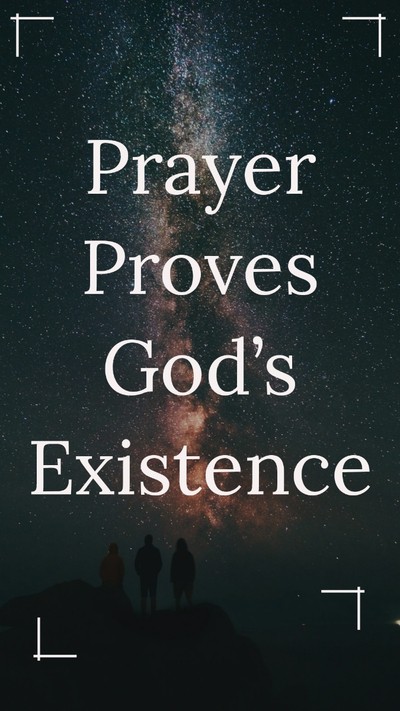
Answered prayers show that God is real. Millions of Christians have prayed God’s will and their prayers were answered. I have prayed things that were answered by God, in a way that I know it was only Him that could have done it. It is always good as a believer to have a prayer journal to write down your prayers.
1 John 5:14-15 “And this is the confidence that we have toward him, that if we ask anything according to his will he hears us. And if we know that he hears us in whatever we ask, we know that we have the requests that we have asked of him.”
Fulfilled prophecy
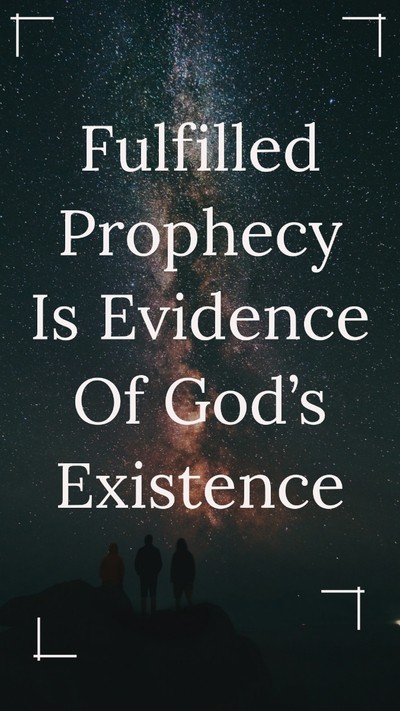
Fulfilled prophecy shows that there is a God and He is the author of the Bible. There were so many prophecies of Jesus that were written hundreds of years before His time, like Psalm 22; Isaiah 53:10; Isaiah 7:14; Zechariah 12:10; and more. There is no way that anyone can deny these passages that were written way before Jesus’ time. Also, there are prophecies that are being fulfilled before our eyes.
Micah 5:2 “But you, Bethlehem Ephrathah, though you are small among the clans of Judah, out of you will come for me one who will be ruler over Israel, whose origins are from of old, from ancient times.”
Isaiah 7:14 “Therefore the Lord himself shall give you a sign; Behold, a virgin shall conceive, and bear a son, and shall call his name Immanuel.”
Psalm 22:16-18 “Dogs surround me, a pack of villains encircles me; they pierce my hands and my feet. All my bones are on display; people stare and gloat over me. They divide my clothes among them and cast lots for my garment.”
2 Peter 3:3-4 “Above all, you must understand that in the last days scoffers will come, scoffing and following their own evil desires. They will say, “Where is this ‘coming’ he promised? Ever since our ancestors died, everything goes on as it has since the beginning of creation.”
The Bible

An amazing reason to believe in God is the truth of His Word – the Bible. God reveals Himself through His Word. The Bible has been heavily scrutinized for hundreds of years. If there was a huge fallacy that proved it was false, don’t you think people would have found it by now? Prophecies, nature, science, and archaeological facts are all in the Scriptures.
When we follow His Word, obeying His commands and claiming His promises, we see wonderful results. We see His transforming work in our lives, healing our spirits, souls, minds, and bodies and bringing true joy and peace. We see prayers answered in amazing ways. We see communities transformed through the impact of His love and Spirit. We walk in personal relationship with the God who created the universe yet engages in every aspect of our lives.
Many one-time skeptics came to belief in God through reading the Bible. The Bible has been well preserved for over 2000 years: we have over 5,500 manuscript copies, many of which date to within 125 years of the original writing, all of which amazingly agree with the other copies with the exception of a few minor aberrations. As new archeological and literary evidence is unearthed, we see increased proof of the Bible’s historical accuracy. Archeology has never proven the Bible wrong.
Everything in the Bible points to God’s existence, from Genesis to Revelation, however, one astounding proof is the multitude of prophecies that have come true. For instance, God named the Persian king Cyrus (the Great) by name decades before he was born! God said through the prophet Isaiah that He would use him (Isaiah 44:28, 45:1-7) to rebuild the temple. About 100 years later, Cyrus conquered Babylon, set the Jews free from captivity, and granted them permission to return home and rebuild the temple at his expense! (2 Chronicles 36:22-23; Ezra 1:1-11)
Prophecies written centuries before Jesus’ birth came true in His birth, life, miracles, death, and resurrection (Isaiah 7:14, Micah 5:2, Isaiah 9:1-2, Isaiah 35:5-6, Isaiah 53, Zechariah 11:12-13, Psalm 22:16, 18). God’s existence is a presupposition in the Bible; however, Romans 1:18-32 and 2:14-16 point out that God’s eternal power and divine nature can be understood through everything God created and through the moral law written on everyone’s hearts. Yet people suppressed this truth and did not honor or give thanks to God; as a result, they became foolish in their thinking.
Genesis 1:1 “In the beginning, God created the heavens and the earth.”
Isaiah 45:18 “For this is what the LORD says– he who created the heavens, he is God; he who fashioned and made the earth, he founded it; he did not create it to be empty, but formed it to be inhabited– he says: “I am the LORD, and there is no other.”
Jesus reveals God to us
God reveals Himself through Jesus Christ. Jesus is God in the flesh. There are many eyewitness accounts of Jesus and His death, burial, and resurrection. Jesus performed many miracles in front of many people and Scripture prophesied about Christ.

“God, after He spoke long ago to the fathers in the prophets . . . in these last days has spoken to us in His Son, whom He appointed heir of all things, through whom He also made the world. And He is the radiance of His glory and the exact representation of His nature and upholds all things by the word of His power.” (Hebrews 1:1-3)
Throughout history, God revealed Himself through nature, but also speaking directly to some people, communicating through angels, and most often speaking through prophets. But in Jesus, God revealed Himself fully. Jesus said, “Anyone who has seen Me has seen the Father.” (John 14:9)
Jesus revealed God’s holiness, His infinite love, His creative, miracle-working power, His standards for living, His plan of salvation, and His plan to carry the Good News to all people on earth. Jesus spoke God’s words, carried out God’s work, expressed the emotions of God, and lived a spotless life as only God can do.
John 1:1-4 “In the beginning was the Word, and the Word was with God, and the Word was God. He was with God in the beginning. Through him all things were made; without him nothing was made that has been made. In him was life, and that life was the light of all mankind.”
1 Timothy 3:16 “Beyond all question, the mystery from which true godliness springs is great: He appeared in the flesh, was vindicated by the Spirit, was seen by angels, was preached among the nations, was believed on in the world, was taken up in glory.”
Hebrews 1:1-2 “In the past God spoke to our ancestors through the prophets at many times and in various ways, but in these last days he has spoken to us by his Son, whom he appointed heir of all things, and through whom also he made the universe.”
We don’t argue what is not real
God is real because you don’t argue what is not real. Think about it for a second. Does anyone argue about the existence of the Easter bunny? No! Does anyone argue about the existence of the fictional Santa Claus that climbs people’s chimneys? No! Why is that? The reason is that you know Santa is not real. It’s not that people don’t think that God is real. People hate God, so they suppress the truth in unrighteousness.

The famous atheist Richard Dawkins can be seen in this video saying, “mock and ridicule Christians” to a crowd of militant atheists. If God is not real, why would thousands of people come out to hear an atheist speak?
If God is not, real why do atheists debate Christians for hours? Why are there atheist churches? Why are atheists always mocking Christians and God? You have to admit that if something is not real, you don’t do these things. These things clearly show that they know He is real, but they want nothing to do with Him.
Romans 1:18 “For the wrath of God is revealed from heaven against all ungodliness and unrighteousness of men, who by their unrighteousness suppress the truth.”
Psalm 14:1 “To the choirmaster. Of David. The fool says in his heart, “There is no God.” They are corrupt, they do abominable deeds, there is none who does good.”
Miracles
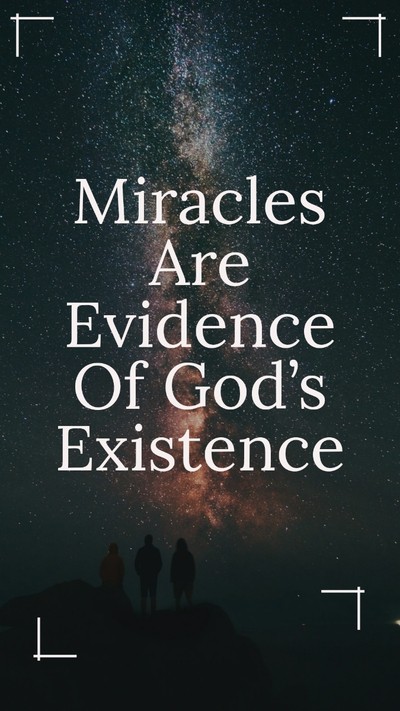
Miracles are great evidence for God. There are many doctors who know God is real because of the miracles that they have witnessed. There is no explanation for the many miracles that go on every day in the world.
God is a supernatural God, and He is also the God who set up the natural order of things – the laws of nature. But throughout Biblical history, God intervened in a supernatural way: Sarah had a baby when she was 90 years old (Genesis 17:17), the Red Sea parted (Exodus 14), the sun stood still (Joshua 10:12-13), and whole villages of people were healed (Luke 4:40).
Has God stopped being a supernatural God? Does He still intervene today in a supernatural way? John Piper says yes:
“ . . . there are probably more miracles happening today than we realize. If we could collect all the authentic stories all over the world — from all the missionaries and all the saints in the all the countries of the world, all the cultures of the world — if we could collect all the millions of encounters between Christians and demons and Christians and sickness and all the so-called coincidences of the world, we would be stunned. We would think we were living in a world of miracles, which we are.”
The universe we live in is a miracle. If you consider the “Big Bang Theory” to be true, then how did the unstable anti-matter not destroy everything? How did all the stars and planets organize themselves without a Supreme Being in control? Life on our planet is a miracle. We haven’t found evidence of life anywhere else. Only our planet Earth is capable of supporting life: the right distance from the sun, the right orbital path, the right combination of oxygen, water, and so on.
Psalm 77:14 “You are the God who performs miracles; you display your power among the peoples.
Exodus 15:11 “Who among the gods is like you, LORD? Who is like you– majestic in holiness, awesome in glory, working wonders?”
Changed lives
I am proof that God exists. Not only me, but all Christians. There are some people who we look at and say, “this person will never change.” They are extremely stubborn and wicked. When wicked people repent and put their trust in Christ, that is evidence that God has done a mighty work in them. When the baddest of the baddest turn to Christ, you see God and that is a huge testimony.
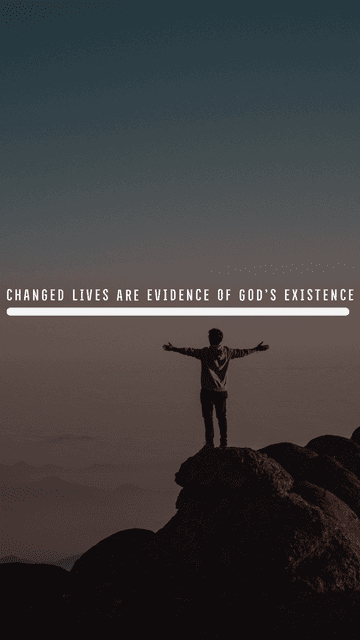
1 Timothy 1:13-16 “Even though I was once a blasphemer and a persecutor and a violent man, I was shown mercy because I acted in ignorance and unbelief. The grace of our Lord was poured out on me abundantly, along with the faith and love that are in Christ Jesus. Here is a trustworthy saying that deserves full acceptance: Christ Jesus came into the world to save sinners—of whom I am the worst. But for that very reason I was shown mercy so that in me, the worst of sinners, Christ Jesus might display his immense patience as an example for those who would believe in him and receive eternal life.”
1 Corinthians 15:9-10 “For I am the least of the apostles and do not even deserve to be called an apostle, because I persecuted the church of God. But by the grace of God I am what I am, and his grace to me was not without effect. No, I worked harder than all of them—yet not I, but the grace of God that was with me.”
Evil

The fact that people and the world is so evil, shows that God exists because it shows that the devil exists. Most people are fueled by violence and wicked things. Satan has blinded many. When I was an unbeliever, I witnessed witchcraft from various friends who were into it. Witchcraft is real and I saw it destroy people’s lives. Where does that dark evil power come from? It comes from Satan.
2 Corinthians 4:4 “Satan, who is the god of this world, has blinded the minds of those who don’t believe. They are unable to see the glorious light of the Good News. They don’t understand this message about the glory of Christ, who is the exact likeness of God.”
Ephesians 6:12 “For our struggle is not against flesh and blood, but against the rulers, against the authorities, against the powers of this dark world and against the spiritual forces of evil in the heavenly realms.”

Why do we suffer?

The problem of suffering is probably the most fiercely debated amongst humans since the days of Job. Another way of posing this question is: Why would a good God allow evil to exist?
A satisfactory answer to this question needs much more space than what is allotted here, but in sum, the reason why suffering exists is because God created humans to have free will. And with free will, humans have chosen to not follow the goodness of God, choosing instead their own patterns of self-centeredness. And so, in the garden, Adam and Eve chose to not live in accordance with God and His goodness, opting instead for their desires. This led to the fall, which corrupted humanity and the world, allowing death and disease to become the punishment for the self-centered lives that humanity would lead.
Why did God create humanity with the capacity of free will? Because he did not want a race of robots who were forced to choose Him. In His goodness and love, He desired love. Humanity has the free will to choose God, or to not choose God. Millenia and centuries of not choosing God has led to much of the evil and suffering that this world has witnessed.
So one can actually say that the existence of suffering is actually evidence of the love of God. But if God is sovereign, then couldn’t He stop my personal suffering? The Bible points out that He can, but He also allows the suffering to teach us something about Him. Reading the story of Jesus healing the man born blind in John 9, we understand that sometimes God allows suffering to display His glory. That suffering is not necessarily someone’s fault or the result of personal sin. God is redeeming that which is the result of humanity’s sin for His purposes of teaching us, or leading us, to know Him.
Therefore, Paul concludes in Romans 8 that: “for those who love God all things work together for good, for those who are called according to his purpose.” Truly, if one loves God and trusts Him, they will understand that the allowance of suffering in their lives is to train them and work for their ultimate good, even if that good will not be revealed until glory.
“Count it all joy, my brothers, when you meet trials of various kinds, 3 for you know that the testing of your faith produces steadfastness. 4 And let steadfastness have its full effect, that you may be perfect and complete, lacking in nothing.” James 1:2-4 ESV
Love
Where did love come from? It certainly did not develop from blind chaos. God is love (1 John 4:16). “We love because He first loved us” (1 John 4:19). Love could not exist without God. “God shows His love for us in that while we were yet sinners, Christ died for us” (Romans 5:8). God pursues us; He longs for a relationship with us.
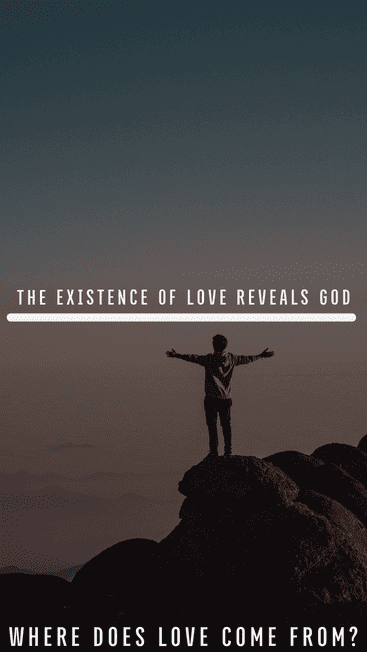
When Jesus walked this earth, He was the personification of love. He was gentle with the weak, He healed out of compassion, even when it meant not having time to eat. He gave Himself to a horrible death on the cross out of His love for mankind – to provide salvation for all who would believe in Him.
Think about that! The God who created the universe and our amazing and intricate DNA desires a relationship with us. We can know God and experience Him in our lives.
How do we have the ability to love someone? Why is love so powerful? These are questions that no one can answer, except the Lord. The reason that you can love others is because God loved you first.
1 John 4:19 “We love because he first loved us.”
God leads Christians
As Christians, we know that God is real because we feel Him leading our lives. We see God opening doors when we are in His will. Through different situations, I see God working in my life. I see Him bringing out the fruits of the Spirit. Sometimes I look back and I say, “oh so that is why I went through that situation, you wanted me to get better in that area.” Christians feel His conviction when we are going in the wrong direction. There is nothing like feeling the presence of the Lord and speaking to Him in prayer.
John 14:26 “But the Advocate, the Holy Spirit, whom the Father will send in my name, will teach you all things and will remind you of everything I have said to you.”
Proverbs 20:24 “A person’s steps are directed by the LORD. How then can anyone understand their own way?”
Arguments against God
In this article, we have already seen that there are arguments against the existence of God. Namely, the materialist argument and the problem of evil and suffering. What should we think about arguments that seek to disprove God?
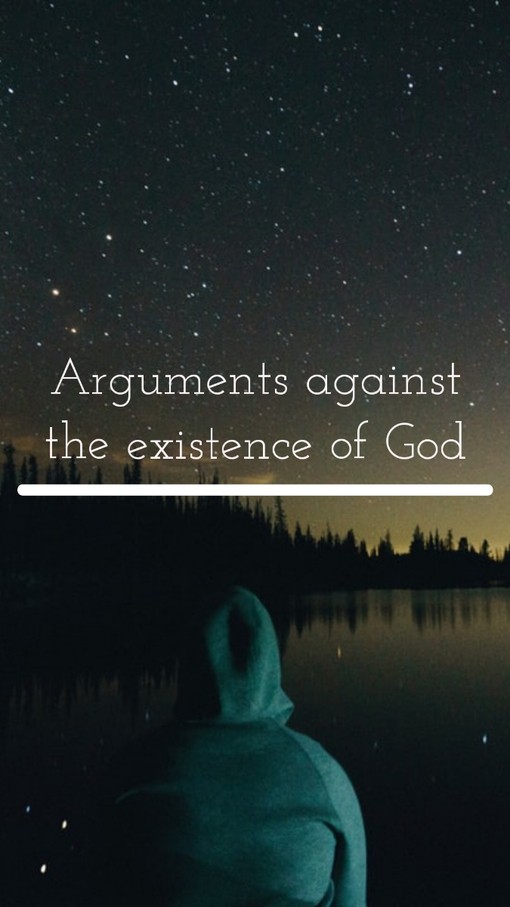
As believers, we should welcome such questions with confidence and assurance that by going back to the Bible, we can find the answers we need. Questions and doubts about God and faith are part of living in the world we live in. People in the Bible even expressed doubts.
- Habaukkuk expressed doubt that God cared about him or his people (ref Habakkuk 1).
- John the Baptist expressed doubt that Jesus really was the Son of God because of his circumstances of suffering. (ref Matthew 11)
- Abraham and Sarah doubted God’s promise when he took matters into his own hands. (ref Genesis 16)
- Thomas doubted that Jesus was really resurrected. (ref John 20)
For believers who doubt, we can rest assured that our questions or moments of unbelief do not cause us to lose our salvation (ref Mark 9:24).
Regarding how to handle arguments against the existence of God, we must:
- Test the spirits (or teachings). (ref Acts 17:11, 1 Thess 5:21, 1 John 4)
- Lovingly point people back to the truth. (ref Eph 4:15, 25)
- Know that the wisdom of man is folly compared to the wisdom of God. (ref 1 Corinthians 2)
- Know that ultimately, trusting in what the Bible says about God is a matter of faith. (ref Heb 11:1)
- Share with others the reason for the hope you have in God. (ref 1 Peter 3:15)
Reasons
An information scientist and a mathematical statistician authored a paper in 2020 describing how molecular fine-tuning in biology challenges conventional Darwinian thinking. In other words, design – which requires a designer (God) – is more scientifically rational than evolutionary theory. They defined “fine-tuning” as an object which: 1) is unlikely to occur by chance, and 2) is specific.

“The chances that the universe should be life permitting are so infinitesimal as to be incomprehensible and incalculable. … The finely tuned universe is like a panel that controls the parameters of the universe with about 100 knobs that can be set to certain values. … If you turn any knob just a little to the right or to the left, the result is either a universe that is inhospitable to life or no universe at all. If the Big Bang had been just slightly stronger or weaker, matter would not have condensed, and life never would have existed. The odds against our universe developing were “enormous” – and yet here we are. . . In the case of fine-tuning of our cosmos, design is considered to be a better explanation than a set of multi-universes that lacks any empirical or historical evidence.”
Atheists say that believing in God’s existence is based on faith rather than evidence. And yet, believing in God’s existence does not deny science – God established the laws of science. Blind chaos could not have manufactured our elegant universe and all the beauty and complexity of nature around us with its symbiotic relationships. Nor could it manufacture love or altruism. New scientific breakthroughs point more to God’s existence than to atheism.
“Intelligent Design (creation by God) . . . can do things which undirected natural causes (evolution) cannot. Undirected natural causes can place scrabble pieces on a board but cannot arrange the pieces as meaningful words or sentences. To obtain a meaningful arrangement requires an intelligent cause.”
How do we know?
How do we know without a shadow of doubt that God is real and active in our lives? After examining and considering the evidence for the existence of God, one must then consider the Word of God and what He has to say to humanity. Considering the Word against the experience of our lives, do we agree with it? And if so, what will we do with it?
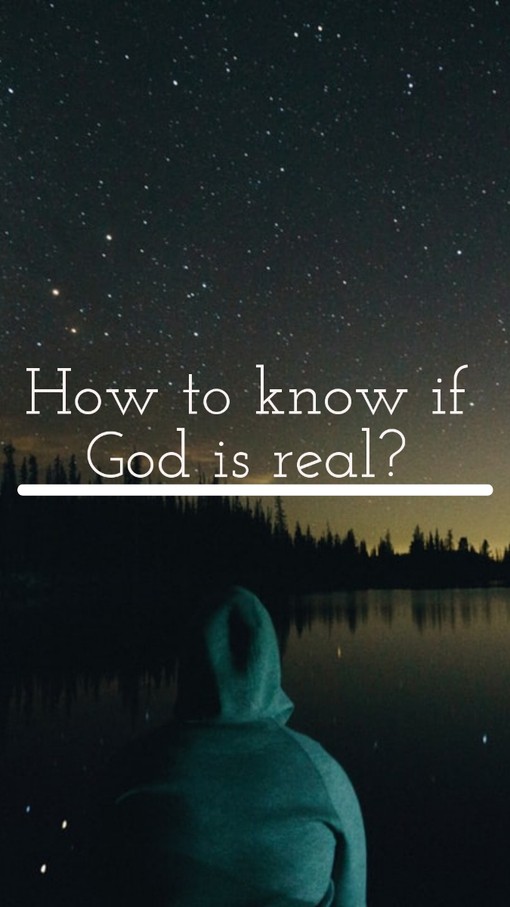
The Bible teaches that people will not come to faith unless their hearts are prepared to receive Christ and respond in such a way to the Word of God. Those who have come to faith will tell you that their spiritual eyes were opened to the truth of God’s Word and they responded.
The clearest evidence for the existence of God are the people of God and their testimony of transformation, from the college student in the dorm room, to the prisoner in the cell, to the drunk at the bar: God’s work, and the evidence of Him moving, is best witnessed in everyday people who have been convinced of their need to be in an active and living relationship with Him.
Belief versus faith

Believing that God exists isn’t the same as placing one’s faith in God. You can believe that God exists without having faith in Him. The Bible says, “the demons also believe, and shudder” (James 2:19). The demons know without any doubt that God exists, but they are in abject rebellion against God, and they shudder, knowing their future punishment. The same can be said about many people.
We are saved by faith in Jesus Christ (Galatians 2:16). Faith includes belief, but also trust and confidence in God. It involves a relationship with God, not just an abstract belief that God is out there somewhere. “”Faith is the divinely given conviction of things unseen”(Homer Kent).
Faith

There are many arguments we could use to support the existence of God. Some of these ideas are better than others. At the end of the day, we know that God is real, not on the strength of the rational arguments we put forth, but on the way God has revealed Himself in nature and in a special way through his Word, the Bible.
That stated, Christianity is a rational world view. Apologetic arguments prove at least that. And we know that it is more than rational, it is true. We can see God’s work in creating the universe. God’s existence is the most rational explanation for the original cause behind everything. And the vast, infinitely complex design we observe in nature (through the scientific method, for example) speaks to an infinitely wise Creator.
We don’t hang our theological hats on apologetic arguments, but they can be helpful to demonstrate the rational Christian understanding of God. Where we hang our hats is the Bible. And the Bible, while making no arguments for the existence of God, begins and ends with the existence of God. In the beginning God.
Is there tangible evidence for the existence of God? Yes. Can we know without a doubt that God is real and active in the world as the Bible describes Him to be? Yes, we can look at the evidence around us and the testimonies of the people who believe, but ultimately this takes a measure of faith. But let us be assured by Jesus’ words to his disciple Thomas that when Thomas doubted His resurrected unless he saw Him with his own eyes and felt the wounds of the crucifixion, Jesus said to him:
“Have you believed because you have seen me? Blessed are those who have not seen and yet have believed.” John 20:29 ESV
Hebrews 11:6 And without faith it is impossible to please God, because anyone who comes to him must believe that he exists and that he rewards those who earnestly seek him.
Conclusion
Since God exists, how does that impact our beliefs and life?
We trust in Christ through faith – not “blind faith” – but faith, nevertheless. It actually takes more faith to not believe in God – to believe that everything around us happened by chance, that non-living matter suddenly became a living cell, or that one kind of creature can spontaneously change into a different kind.
If you want the real story, read the Bible. Learn about God’s great love for you. Experience a relationship with Him by receiving Him as your Lord and Savior. Once you begin walking in relationship with your Creator, then you will have no doubt He is real!
If you are not saved and you want to learn how you can be saved today, then please read how to become a Christian, your life depends on it.
https://blogs.scientificamerican.com/observations/can-science-rule-out-god/
John Calvin from Bondage and Liberation of the Will, edited by A.N.S. Lane, translated by G. I. Davies (Baker Academic, 2002) 69-70.
SteinarThorvaldsena and OlaHössjerb. “Using statistical methods to model the fine-tuning of molecular machines and systems.” Journal of Theoretical Biology: Volume 501, Sept. 2020. https://www.sciencedirect.com/science/article/pii/S0022519320302071
https://apologetics.org/resources/articles/2018/12/04/the-intelligent-design-movement/
Thomas E. Woodward & James P. Gills, The Mysterious Epigenome: What Lies beyond DNA? (Grand Rapids: Kregel Publications, 2012. https://www.amazon.com/Mysterious-Epigenome-What-Lies-Beyond/dp/0825441927?asin=0825441927&revisionId=&format=4&depth=1#customerReviews
Vivian Chou, How Science and Genetics are Reshaping the Race Debate of the 21st Century (Harvard University: Science in the News, April 17, 2017).
https://www.desiringgod.org/interviews/why-do-we-see-so-few-miracles-today
Reflection
Q1 – How do we know that there is a God? What proof is there that He exists?
Q2 – Do you believe that God is real? If so, why? If not, why not?
Q3 – Do you doubt or sometimes doubt the existence of God? Consider bringing it to Him, learning more about Him, and surrounding yourself with Christians.
Q4 – If God is real, what is one question that you would ask Him?
Q5 – If God is real, what is something that you would praise Him for?
Q6 – Do you know the proof of God’s love? Consider reading this article.

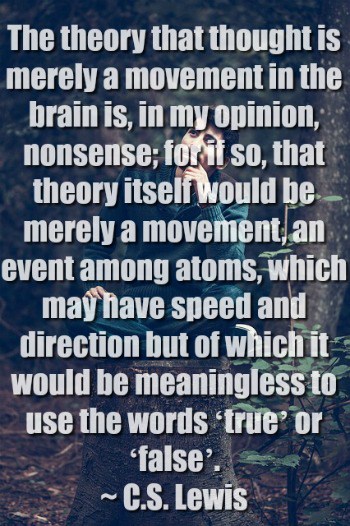
God is not real because my WHOLE family knows that God is no real and I believe them.
Hey Suzan,
Thank you for stopping by. I encourage you to read the article again with an open mind. Try your best to remove any presuppositions. I encourage you to get alone and seek Him for yourself. Ask Him to reveal Himself to you.
Fritz
Hi,
I was very skeptical about this topic.. Which this really helped me, I feel as if there could possibly be a God somewhere, just need to seek him and his words and try to understand both sides of the argument of real or not.
Hey Maddi,
Thank you for stopping by. Also, thank you for your humility and willingness to be open-minded about God. As you said, I encourage you to seek Him and pray that He reveals Himself to you. Look in His Word and also check out a biblical church near you and talk to believers. I will be praying that you truly experience the Lord and ultimately rest in the perfect work of Christ for salvation.
God bless,
Fritz